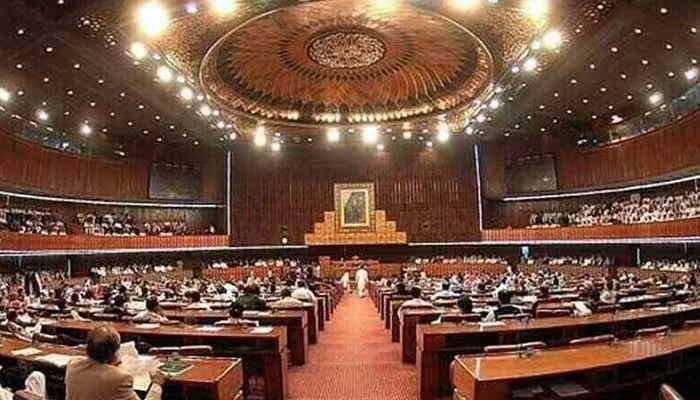The law and order situation in Pakistan has significantly worsened, as admitted by the Ministry of Interior during a session in the National Assembly. The grim reality of the rising violence was laid bare in a detailed written reply, highlighting not only the growing number of terrorism incidents across the country but also the efforts being undertaken to counter this alarming trend.
Rising Violence and Terrorism: A Nationwide Concern
The Ministry of Interior’s report paints a distressing picture of the security situation in Pakistan. Between January and December 2023, the country witnessed a staggering 930 fatalities and 1,992 injuries as a result of terrorism. These statistics underscore the increasing threat of terrorism, which has affected multiple provinces, with Khyber Pakhtunkhwa and Balochistan being the hardest hit.
Khyber Pakhtunkhwa emerged as the most affected region, with 558 incidents of terrorism last year. These attacks resulted in the martyrdom of 580 people and left 1,447 injured. Among the victims were 402 civilians who lost their lives, while 1,054 security personnel were among the injured. The scale of violence in this region highlights the persistent challenges faced by law enforcement agencies in maintaining peace and order.
Similarly, Balochistan faced 626 terrorism-related incidents, leading to 315 deaths and 477 injuries. Of those killed, 148 were civilians, and 198 were security officials. Balochistan has long been a hotspot for militant activity, with insurgent groups targeting both local and foreign nationals, particularly those involved in development projects like the China-Pakistan Economic Corridor (CPEC).
In Sindh, while the number of incidents was relatively lower, the impact was still devastating. The province witnessed 19 incidents of terrorism, resulting in 14 deaths and 31 injuries. Among the casualties, 8 were civilians, and 26 were security personnel. The situation in Sindh, especially Karachi, has historically been volatile, with various criminal and militant groups operating in the region.
Gilgit-Baltistan also faced its share of violence, with 9 deaths and 26 injuries reported in just 3 incidents of terrorism last year. This region, often perceived as a relatively peaceful area, has also seen an uptick in violence, indicating that no part of the country is immune to the threat of terrorism.
Government’s Response: National Policy and Border Security
In response to the deteriorating security situation, the Ministry of Interior has developed the National Policy for the Prevention of Violent Extremism 2024. This policy, currently awaiting approval from the Federal Cabinet, aims to address the root causes of extremism and violence in the country. The policy is expected to provide a comprehensive framework for preventing radicalization and curbing the spread of extremist ideologies.
Additionally, the government is focusing on improving border security. The process of fencing the border, particularly along the western frontiers, is ongoing. This measure is crucial in preventing the cross-border movement of militants and restricting the flow of arms and illegal substances, which fuel the insurgencies in Balochistan and Khyber Pakhtunkhwa.
Moreover, the government has revised the Standard Operating Procedures (SOPs) for the protection of Chinese and other foreign nationals working on CPEC and other significant projects. This comes in the wake of several high-profile attacks targeting foreign workers, particularly from China. The new SOPs are expected to enhance the security of these individuals and prevent further disruptions to critical infrastructure projects.
Intelligence and Counter-Terrorism Operations
The Ministry of Interior also highlighted the success of intelligence-based operations across the country. In the first quarter of 2024 alone, 2,208 operations were conducted based on secret information, resulting in the elimination of 89 terrorists and the arrest of 328 others. These operations are part of a broader strategy to dismantle terrorist networks and prevent attacks before they occur.
However, the Ministry’s report also acknowledges the ongoing challenges, particularly the need for more robust intelligence-sharing mechanisms and better coordination between various law enforcement agencies. The continued threat to foreign nationals, as evidenced by the multiple attacks on Chinese and Japanese residents between 2020 and 2024, remains a significant concern. These incidents have not only resulted in the loss of lives but have also strained diplomatic relations and impacted foreign investment in the country.
The Road Ahead: Addressing the Challenges
The acknowledgment of the worsening law and order situation by the Ministry of Interior is a step towards addressing the deep-rooted issues of extremism and violence in Pakistan. However, the road ahead is fraught with challenges. The implementation of the National Policy for the Prevention of Violent Extremism will be crucial in addressing the underlying causes of terrorism, such as poverty, lack of education, and political disenfranchisement.
Moreover, there is an urgent need for continued investment in the country’s security infrastructure, particularly in improving intelligence capabilities and border security. The government’s efforts to secure foreign nationals and prevent attacks on critical infrastructure projects like CPEC must be complemented by a broader strategy to improve overall security and stability.
while the government’s efforts are commendable, the rise in terrorism incidents across the country serves as a stark reminder of the ongoing challenges in maintaining law and order. It is imperative that the government, law enforcement agencies, and the public work together to create a safer and more secure Pakistan. The successful implementation of the National Policy for the Prevention of Violent Extremism, along with enhanced security measures, will be key in turning the tide against terrorism and restoring peace in the country.



